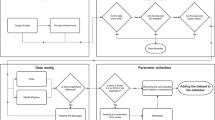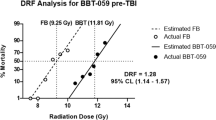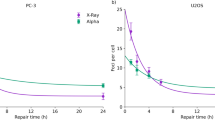Abstract
RECOVERY from sublethal damage by ionizing radiation is considerably reduced or prevented if the organisms are kept in hypoxic conditions between the irradiation fractions1,2. The dependence of the recovery process on metabolic energy has been assumed to be the basis of this effect. But because these experiments were conducted with organisms which are not capable of anaerobic fermentation, it appeared to be desirable to study split-dose recovery in cells which can live and divide anaerobically as well as aerobically. This is relevant to radiotherapy, because many hypoxic cells in tumours might be capable of anaerobic glycolysis.
This is a preview of subscription content, access via your institution
Access options
Subscribe to this journal
Receive 51 print issues and online access
$199.00 per year
only $3.90 per issue
Buy this article
- Purchase on Springer Link
- Instant access to full article PDF
Prices may be subject to local taxes which are calculated during checkout
Similar content being viewed by others
References
Howard, A., Int. J. Radiat. Biol., 14, 341 (1968).
Bryant, P. E., Nature, 20l, 94 (1964).
Wickerham, L. J., Tech. Bull. US Dep. Agric., 1029 (1951).
Hersch, P., Instrum. Pract., 2, 937 (1957).
Author information
Authors and Affiliations
Rights and permissions
About this article
Cite this article
KIEFER, J. β-Ray Split-dose Recovery in Diploid Yeast in Hypoxic Conditions. Nature 223, 405–406 (1969). https://doi.org/10.1038/223405a0
Received:
Revised:
Issue Date:
DOI: https://doi.org/10.1038/223405a0
Comments
By submitting a comment you agree to abide by our Terms and Community Guidelines. If you find something abusive or that does not comply with our terms or guidelines please flag it as inappropriate.



